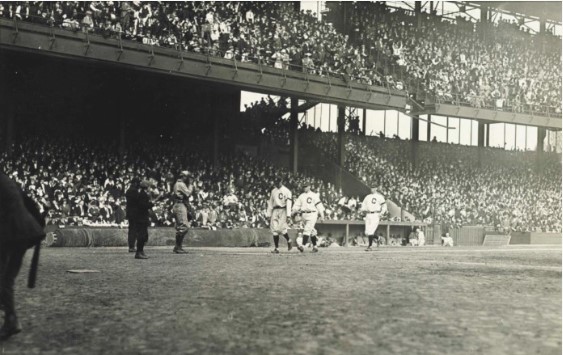|
Pivotal World Series Moments
Grand Slam and Unassisted Triple Play
1920 World Series Game 5: Brooklyn Robins @ Cleveland Indians
The best-of-nine Series was tied at two games apiece as 26,884 gathered on a Sunday afternoon at League Park in Cleveland. They would be treated to three plays that had never been seen in a World Series game to that point, one of which has still not been repeated in the Fall Classic over a century later. Renowned sportswriter Grantland Rice called it "the most amazing ball game every played."
 Cleveland's League Park First World Series Grand Slam
Spitballer Burleigh Grimes was Brooklyn's top pitcher with 23 wins against 11 losses and an ERA of just 2.22. He had shut out the Indians in Game 2, 3-0. However, the Cleveland batters noticed something in that game that may have helped them in Game 5. Brooklyn C Otto Miller tossed dirt after he gave the sign for each pitch. When he threw dirt forward after giving the signal, Grimes threw a fastball. When he threw the dirt between his legs to the rear, in came the spitball. When word got out after the Series, Grimes brushed it aside. But he couldn't deny that he started the bottom of the first in the worst way possible.
LF Charlie Jamieson singled to right field.
After failing to sacrifice, 2B Bill Wambsganss singled to left field with Jamieson stopping at second.
CF Tris Speaker bunted down the third base line and was safe at first when Grimes slipped trying to field the ball to load the bases.
Up to the plate stepped RF Elmer Smith, a left-handed batter who led the Indians in home runs during the season with 12. Here's how Henry P. Edwards described the at-bat in the Cleveland Plain-Dealer.
Twice did Elmer swing with all his might, fairly whirling all the way around as he missed connections. Grimes' third offering was over the plate but low. Umpire Klem rightfully called it a ball.
The next was a fast ball, waist high. It no sooner had left Grimes' hand than Smith intuitively knew it was not a spitter. He obtained a perfect toehold and swung with every ounce of strength. Up and up went the ball over the infield, over Right Fielder Griffith, over wall and screen, over Lexington Avenue, finally falling on the opposite side of that thoroughfare. And Elmer followed Jamieson, Wambsganss and Speaker home while the huge throng leaped to its feet and cheered him every step of the way. Bagby Helps His Own Cause
Grimes settled down and shut down the Indians until the bottom of the fourth. 1B Doc Johnston smashed a liner "which nearly tore a wing off Burleigh," then went to second on a passed ball. SS Joe Sewell grounded out 5-3 with the runner taking third. The Robins walked C Steve O'Neill intentionally to bring up P Jim Bagby. He spoiled the strategy by lofting a home run into the temporary bleachers erected in right-center field for the Series to make it 7-0. He thus became the first pitcher to homer in a World Series game.
 Cleveland P Jim Bagby arrives at home plate after clouting a three-run homer. (Louis Van Oeyen) Three Outs on One Pitch
The first two Robins reached base in the top of the fifth against Bagby. 2B Pete Kilduff singled to left-center field and moved to second on Otto Miller's single to center. Brooklyn manager Wilbert Robinson sent up Clarence Mitchell to bat for Grimes. Mitchell was a southpaw pitcher and left-handed batter who also played first base. He hit .367 in 1919 and .234 in '20.
Mitchell cracked a ringing line drive toward right-centerfield. 2B Wambsganss took several steps to his right, "lifted himself to his toes, made a slight spring and reached the ball overhead with both hands." With both runners off with the crack of the ball, Wamby stepped on second base to retire Kilduff. Then he turned and tagged Miller, who had stopped when the ball was caught and made no resistance.
 Bill Wambsganss completes the unassisted triple play by tagging Otto Miller. The other runner, Pete Kilduff, is at third base. Cleveland scored another run in the bottom of the fifth, and the Robins avoided a shutout with a run in the ninth to make the final score 8-1.
The Indians won the Series in seven games.
  L: Jim Bagby; R: Bill Wambsganss Reference: Joe Niese, Burleigh Grimes: Baseball’s Last Legal Spitballer (2014)
|